Frances Ridley Havergal (1836-1879)
Hymn and Devotional Writer
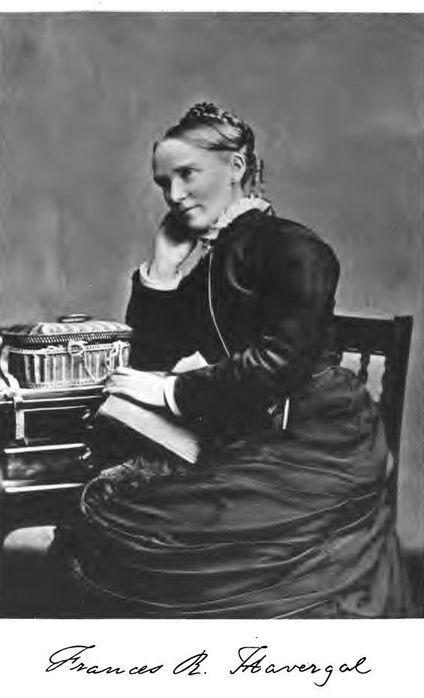
F.R.H. Directory
Bible Study and Devotional Life
Hymns and Quotations on Music and Art
Books of Frances Ridley Havergal
Quotations from Frances’ Letters
Biographies of Frances Havergal
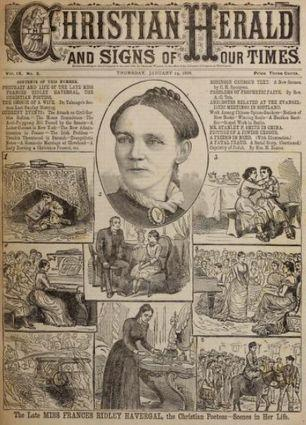
Frances Ridley Havergal was a precocious English poet, author and musician. Born into an Anglican family at Astley, her father. W. H. Havergal, was a pastor, composer and hymn writer. She led a fairly quiet life and suffered quite a bit of illness. She credited the little booklet All For Jesus with transforming her life. In addition to composing hundreds of poems, she also composed hymn tunes to go with some of them, wrote a book—Kept for the Master's Use, and many devotionals. She also memorized the Gospels, the Epistles, Revelation, the Psalms, Isaiah and the Minor prophets. She was also an accomplished pianist and singer. She kept up an extensive correspondence that was later used in preparing the Memorials book that her sister put together. She eventually died of peritonitis at Caswell Bay in Wales. Many of her works were published after her death.
Charles Bullock: Near the Throne
This book is about the inner life experience of Havergal. Charles Bullock is well qualified to write on this theme since he was her pastor for many years. Bullock wrote other books, including The Sisters and Within the Palace Gates, the latter being a memorial that was published shortly after Frances' death.
Charles Bullock: The Sisters
This is a biography of Frances and her sister Maria, however the biographies are presented separately.
Davies, Edward: Frances Ridley Havergal - A Full Sketch of Her Life
The book was primarily drawn from the Memorials volume compiled by her sister and her letters, the stated objective being to provide readers a shorter volume that surveyed her entire life.
A Biography From the Chautauquan
This biography focuses more on her musical and literary accomplishments.
Early Life
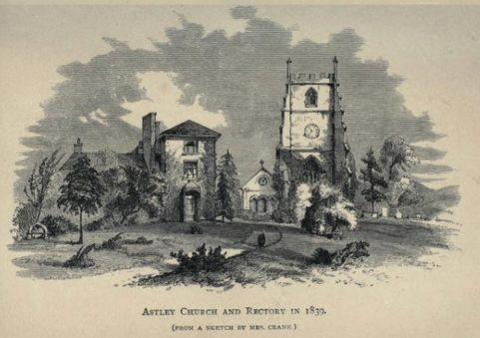
Birth at Astley, Worcestershire
Frances Ridley Havergal was born on December 14, 1836, the youngest child of William Havergal and his wife Jane. William was the Rector of Astley, Worcestershire. She had five siblings: Jane, Henry (a pastor), Maria (who would later compile her Memorial biography), Ellen and Francis (also a pastor).
W. H. Havergal - Her Father
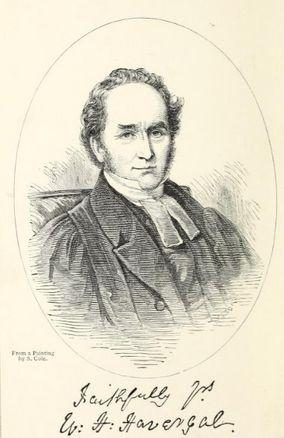
Frances was the youngest daughter of W. H. Havergal (1793-1870), a pious man with many gifts. An acknowledge authority on church music and psalmody, he refused a post to be the Professorial Chair of Music at the University of Oxford out of his devotion to ministry. As a result, Frances was raised in an environment of music and poetry. Her natural gifts were also developed so that she was able to use them for God's glory, with great ability. Her Father was ordained as a priest in 1817, served at Astley in Worcestershire for 13 years beginning in 1829. Later he served at St. Nicholas in Worcester in 1842.
He was thrown out of a carriage in 1829, at which time he sustained some brain injuries. His relief was music. Among his compositions was the anthem-like setting of "From Greenland’s Icy Mountains." He also lost most of his sight in 1832, resulting in an inability to read printed music or decipher his own writing for quite some time, and never fully recovered. Weakened health eventually brought about a resignation from St. Nicholas in 1860. In 1867 he laid aside all of his church work and resided in Leamington. He died very unexpectedly on Easter Sunday, April 19, 1870—he had been unusually well only one week before, and was playing and singing hymns only the night before—and was buried at Astley. He was married twice: Jane Head (May 2, 1816), and Caroline Ann Cooke (July 29, 1851). He had five children.
Her Mothers
Frances was blessed with a godly mother—Jane, and a godly stepmother—Caroline.
Regarding the first, she spoke of the influence of seeing her mother reading the Bible:
"Mother's large Bible always lay on the table in her room. Often I wondered why at four o'clock every afternoon she went into her room and locked the door till nearly tea-time at six. At last I tried the door, and it was not locked—mother was reading her Bible! That made me think more of the Bible than ever before."
When her mother died, she wrote the following in Four Happy Days (written under the name Annie):
"The clouds had been Annie's great friends since she had had no trees to sit in and make up fancies about. Sometimes she watched the clouds and wondered all sorts of things about them, and especially wished she could reach the splendid white ones which looked like snow mountains that could be climbed and rested upon. But she found in a book that they were only vapour like the others, and that there would be nothing to rest upon and look down upon, only dismal thick mist and rain. Poor child! there are other bright things besides shining clouds which, when reached, are only mist and tears. . . She was musing over some words which had just been spoken in her mother's room. 'Annie,dear, pray to God to prepare you for all He is preparing for you.' Her mother said them very feebly and solemnly when she said good-night, and now they seemed to sound over and over again, so that they nevershould or could be forgotten. 'I wonder what He is preparing for me,' she thought. 'Oh, I do hope He is preparing one of the many mansions for me! How I wish I knew whether He is! But I don't think He is preparing me for it, else I should not feel naughty so often.' But her mother meant something sadder and nearer, which she knew God was surely preparing day by day for her little girl; she knew it could not be very long before she would be singing the 'new song' in perfect joy, while all her child's little songs would be hushed in great sorrow, the greatest that a child can know. Her mother saw how strangely she was unprepared for all this, and she never would stay to listen to any thing her sisters said about their dear mother being worse."
She also spoke of her mother encouraging her to make her room a little “Bethel”:
“'Dear child, you have your own little bedroom now; it ought to be a little Bethel.' I could not then make head or tail of what she meant, and often wondered, till some months after, when reading in Genesis, I came to the chapter; and then I understood it. Having that small room to myself developed me much as a child; it was mine, and to me it was the coziest little nest in the world.
Frances' Name
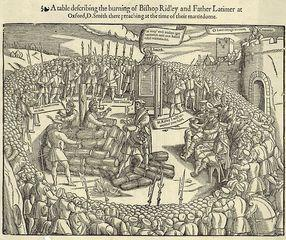
In the Ministry of Song Frances writes of her love for the name "Ridley," because it showed that she descended from a godly bishop by the name of Ridley—Nicholas Ridley (1500-1555)— who was one of the Oxford Martyrs who died for his teachings and support of Lady Jane Grey during the Marian Persecutions, on October 16, 1855.
As she put it,
"But 'what the R. doth represent'
I value and revere,
A diamond clasp it seems to be,
On golden chains, enlinking me
In loyal love to England's hope,
The Church I hold so dear."
While a child, she was called "Fanny," but her father writes of his displeasure of that name. But from the time of the publication of Ministry of Song, her usual signature was Frances, but she preferred the name given her at her baptism as an infant.
Growing Up and Family Influences
Her reading skills progressed quickly, reading the Bible and ordinary books by the age of four. French and Music were also added over time.
Sunday evenings were spent singing hymns. By that time her father was an invalid and music was his solace—he composed award-winning music for the church services and other sacred songs.
Her first rhymes were written at the age of seven, and by the age of nine she was writing letters in perfect rhyme to her brother Frank and other young friends.
In 1842 the family transitioned via Henwick House in Hallow, to the Rectory of St. Nicholas, Worcester in 1845.
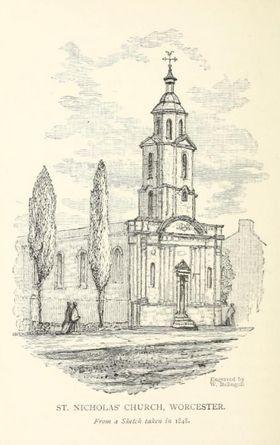
Conversion
In a mini autobiography that was penned in 1859 when she was in her early 20s, she speaks of having no recollection of religious ideas up to the age of six. However, at that time she heard a sermon at Hallow Church which dwelled much on hell and judgment and what a fearful thing it would be to fall into the hands of the living God. The sermon "haunted" her, and she thought about it day and night. But, "I began to pray a good deal, though only night and morning, with a sort of fidget and impatience, almost angry at feeling so unhappy, and wanting and expecting to get a new heart, and have everything put straight and be made happy, all at once. This sort of thing went on at intervals, not at all continuously, for often a month or two would pass without a serious thought or anything like true prayer."
She described how change began with dissatisfaction: "One spring (I think 1845) I kept thinking of them, and a dozen times a day said to myself, "Oh if God would but make me a Christian before the summer comes !" because I longed so to enjoy His works as I felt they could be enjoyed. And I could not bear to think of another summer coming and going, and finding and leaving me still 'not a Christian.'" ... "All this while I don't think any one could have given the remotest guess at what passed in my mind, or have given me credit for a single serious thought. I knew I was "a naughty child," never entertained any doubts on the subject; in fact, I almost enjoyed my naughtiness in a savage desperate kind of way, because I utterly despaired of getting any better, except by being "made a Christian," which, as months passed on, leaving me rather worse than better, was a less and less hoped for, though more and more longed for, change."
The change to St. Nicholas' Rectory in 1845 did not improve her spiritual prospects, though a sermon awakened her from her spiritual slumber: "Soon after coming, a sermon by the curate on "Fear not, little flock," etc., struck me very much, and woke me up again from a longer slumber to a more restless unhappiness than usual. I did so want to be happy and be "a Christian," which term embraced everything I could possibly think of in the way of happiness. And I didn't at all see how I was to be, except by praying very hard; and that I had done so often that I got quite disheartened at its resultlessness. At this time I don't think I had any clear ideas about believing on the Lord Jesus, and so getting rid of the burden which had pressed so long upon my little soul. My general notion was that I didn't love God at all, and was very bad and wicked altogether; that if I went on praying very much, something would come to me and change me all at once, and make me like many whom I read about and a few whom I saw. As for trying to be good, that seemed of next to no use; it was like struggling in a quicksand, the more you struggle the deeper you sink."
Her mother's illness and death in 1848 only caused bitterness on her part, and she refused to see God's hand in what went on. She wrote of her experience in "Four Happy Days."
Her mother had said some words, however, that began playing in her mind: "'Fanny dear, pray to God to prepare you for all that He is preparing for you.' Her mamma said them very feebly and solemnly when she said good-night, and now they seemed to sound over and over again, so that they never should or could be forgotten. 'I wonder what He is preparing for me,' she thought. 'Oh I do hope He is preparing one of the many mansions for me! how I wish I knew whether He is! But I don't think He is preparing me for it, else I should not feel naughty so often."
Her mother also encouraged her to make her room a little "Bethel: "I also remember, 'Dear child, you have your own little bedroom now, it ought to be a little Bethel.' I could not then make head or tail of what she meant, and often wondered, till some months after, when reading in Genesis I came to the chapter; and then I understood it. Having that small room to myself developed me much as a child; it was mine, and to me it was the cosiest little nest in the world."
She recognized that she did not love God: "I KNOW I did not love God at this time, the very thought of Him frightened me; but sometimes a feeling not unlike love would make me go to sleep with a wet pillow. It would often be thus. Going to bed, I would determine I would try to think about God, hard as it was; and after I lay down, as my thoughts did not flow at all naturally heavenward, any more than water flows upward, I forced them into a definite channel by a half whisper. "How good it was of God to send Jesus to die!" was my usual beginning, while I by no means felt or believed that wonderful goodness. Nevertheless it usually ended in my crying most heartily because I was so bad and He was so good, and because I didn't and couldn't love Him when He even died for sinners."
"In the end of May [1850] I joined Ellen in London, and we spent six weeks of gorgeous summer weather together at Wycombe with grandpapa. What brought it before me I don't know, but now came a more definite and earnest prayer, for faith. Oh to believe in Jesus, to believe that He had pardoned me! I used to go to bed rather early, and lie awake in the long summer twilight till Ellen came up, praying for this precious gift. Oh for faith! That was my cry ; but it was not given, at least not as and when I asked. I read a great deal of the Bible at this time in a "straight on" sort of way, expecting to come to something which would set me free and bring the great gift of faith within my grasp. How I got it I can't in the least tell; but certainly about this time I had a clearer idea of salvation than ever before, though I fancied myself farther than ever from its blessedness."
Mrs. Teed’s Great Campden House School
Frances’ mother died in 1848 and she was sent to Mrs. Teed’s school in August of 1850, prior to her father’s second marriage. While there the refreshing showers of the Holy Spirit were felt and many of the older girls were converted. One of them, Diana, Frances’ closest friend, drew her into a room alone and there told of the joy that she had found in Christ, and begged her to also give her heart to Him: "She begged me to go to Jesus and tell Him I wanted to love Him and could not, and then He would teach me to. The words of wise and even eminent men have since then fallen on my ear, but few have brought the dewy refreshment to my soul which the simple loving words of my little Heaven-taught school-fellow did." Her sister Ellen also attended Mrs. Teed’s school and similarly found Christ.
Confirmation at Worcester Cathedral, 1854
Havergal's confirmation at Worchester Cathedral was a deeply meaningful, and important step in her continued spiritual growth.
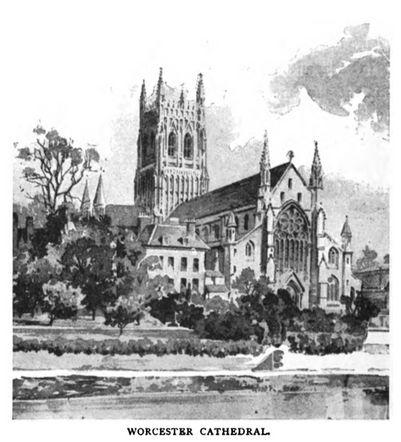
Frances Havergal Read All For Jesus
J. T. Wrenford: All For Jesus
Frances received this booklet in a letter from a friend in late 1873. It made a great impression on her and she told her sister that she saw the blessedness of full consecration in an ever-changing way on December 2, 1873. I am fairly certain this is the text of the booklet since the publisher is identified in the Memorials. Here is what Frances wrote of reading the booklet:
"The hour of conflict had arrived. The struggle was severe. “My feet were almost gone, my steps had well nigh slipped.” But at length the light came. As with a sunbeam the truth was revealed. I saw that I had to do with Jesus personally, and that my safety depended upon really accepting Him, and really and fully surrendering myself to Him. I fell on my knees before Him. The Spirit helped my infirmities. With all my soul I did, there and then, accept Him—my “Wisdom, Righteousness, Sanctification, and Redemption,” my Savior and my Lord; and I did, there and then, surrender myself to Him, utterly and unreservedly. Then the blessing came. I rose from my knees rejoicing! “Jesus is mine!” I could exclaim, “and I am His.” The uncertainty was gone. The doubts and fears had departed. I had passed beyond the “hoping” and “trusting”—at last, but surely. And now it was as though Jesus Himself was speaking to my soul, and I could hear His voice. Yes, the blessing had indeed come, and such a blessing! I found I had that “peace” which “passeth all understanding,” and that which is “unspeakable and full of glory.” Ever since that day I have been living a new life. I am so happy. “All for Jesus,” is my daily, almost hourly life. And Jesus is so precious! I cannot describe the sweetness of His presence and fellowship. It is so real, so constant, so sustaining to the soul. I have trials and difficulties, toils and hardships, but they seem as nothing now. The blessing is so great, that these things are “light,” and “but for a moment.” Besides, I know that, the hand of Jesus lightens the burden: He carries the heavy end of each cross. And all the while He speaks so comfortably to my soul, so gently, encouragingly, lovingly, that I cannot but go on rejoicing in Him, whatever the present trial may be.'
An Excerpt from Wrenford's All For Jesus:
Here is a portion of the text of Wrenford's booklet. Clicking on the link you can read all of the text.
"Then the blessing came. I rose from my knees rejoicing! “Jesus is mine!” I could exclaim, “and I am His.” The uncertainty was gone. The doubts and fears had departed. I had passed beyond the “hoping” and “trusting”—at last, but surely. And now it was as though Jesus Himself was speaking to my soul, and I could hear His voice. Yes, the blessing had indeed come, and such a blessing! I found I had that “peace” which “passeth all understanding,” and that which is “unspeakable and full of glory.” Ever since that day I have been living a new life. I am so happy. “All for Jesus,” is my daily, almost hourly life. And Jesus is so precious! I cannot describe the sweetness of His presence and fellowship. It is so real, so constant, so sustaining to the soul. I have trials and difficulties, toils and hardships, but they seem as nothing now...."
(Read Wrenford's "All for Jesus" document.)
Frances' Life was Changed By Reading All For Jesus
"‘All’ is all; and as we may trust him to cleanse from the stain of past sins so we may trust him to cleanse from all present defilement; yes, all! If not, we take away from this most precious promise, and, by refusing to take it in its fullness, lose the fullness of its application and power. Then we limit God’s power to ‘keep;’ we look at our frailty more than at his omnipotence. Where is the line to be drawn beyond which he is not able? The very keeping implies total helplessness without it, and the very cleansing most distinctly implies defilement without it. It was that one word ‘cleanseth’ which opened the door of a very glory of hope and joy to me. I had never seen the force of the tense before, a continual present, always a present tense, not a present which the next moment becomes a past. It goes on cleansing, and I have no words to tell how my heart rejoices in it. Not a coming to be cleansed in the fountain only, but a remaining in the fountain, so that it may and can go on cleansing." (Read all of Frances' response to the reading of this precious booklet.)
Havergal's Bible Study and Devotional Life
On this page you will find a page of her marked Bible, as well as a more readable copy of some of her studies.
"All Things" Bible Study
This is a wonderful study on how we find "all things" in Christ.
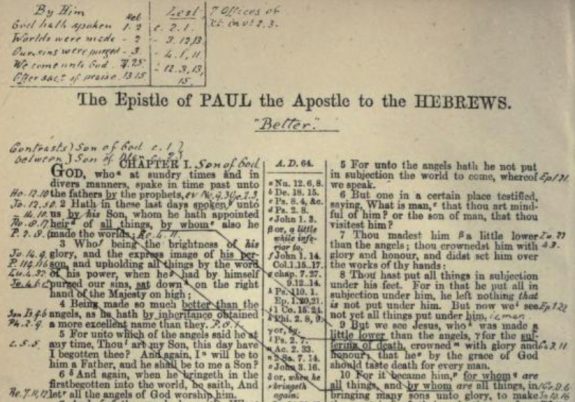
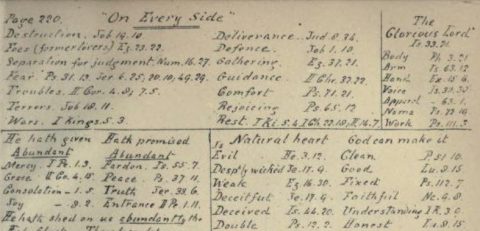
Havergal's Hymns:
Havergal was an accomplished pianist and composer of hymns. In the Memorials book there are also a few paragraphs devoted to her comments on music. You will also find the lyrics of five of her more popular hymns. Eventually there will be some history on the writing of these hymns.
Take My Life and Let It Be
Like A River Glorious
I Gave My Life for Thee
Live Out Thy Life Within Me
Lord Speak To Me
Quotations and Writings On Music and Art
Frances Havergal was a lover of music and an accomplished musician. She accordingly composed hymns as you may have read about already. She also had a great interest in what we refer to as "classical" music and wrote spiritual applications of what she was hearing, of which we include a few.
Her Article on the Hymns of Horatius Bonar
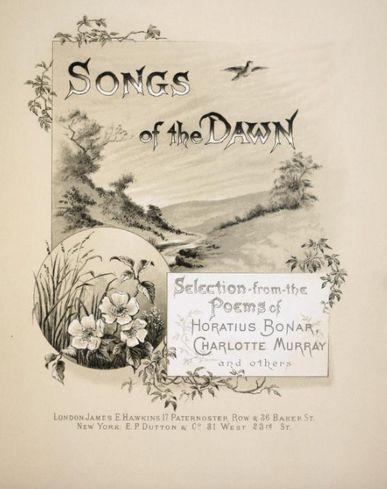
One gains further insight into Havergal's thinking in this unfinished manuscript on the hymns of Horatius Bonar. Bonar (1808-1889) was a pastor in Scotland—initially the Church of Scotland and later the Free Church of Scotland, friend of Robert Murray M'cheyne, and poet. He is best known as a writer of many much appreciated hymns.
Frances Ridley Havergal's Poetry
Frances wrote her first rhyme at the age of seven. She would continue writing poetry, some of which ended up as the words of hymns, the rest of her life. Click on the link to read some samples.
Journal of Mercies
Fances Havergal never kept a diary, but Mrs. Charles Bullock, the wife of the family pastor for years and later biographer, sent her a little "Journal of Mercies for 1879. In acknowledging the gift, she wrote, "Thanks for the charming Journal you sent me, I like it greatly. I put down whichever "mercy' seems uppermost in my mind for each day; not one in a thousand though!"
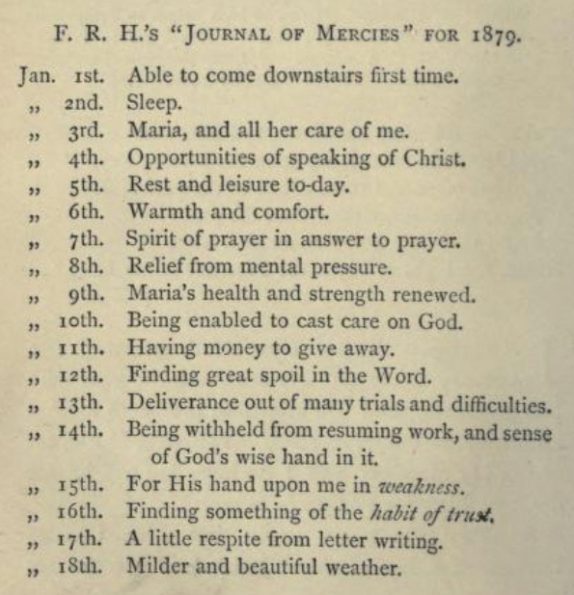
Books of Frances Ridley Havergal
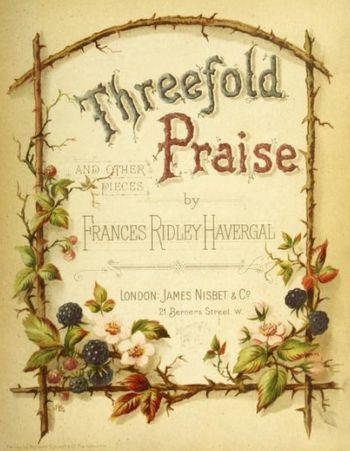
Kept for the Master's Use
This is a wonderful book in which Frances shares the meaning of each couplet of her Consecration Hymn (Take My Life and Let It Be).
Ministry of Song
Memorials of Frances Ridley Havergal
This biography was put together by her sister Maria from letters written by Frances, thus allowing Frances to tell her own story.
My King
Blossoms from a Believer's Garden
The Royal Invitation
Starlight Through the Shadows
Royal Commandments
Royal Bounty
Loyal Responses
Coming to the King (Epub document)
Coming to Christ
Compensation
Morning Bells
This is a morning devotional for children.
Little Pillows
This is an evening devotional for children.
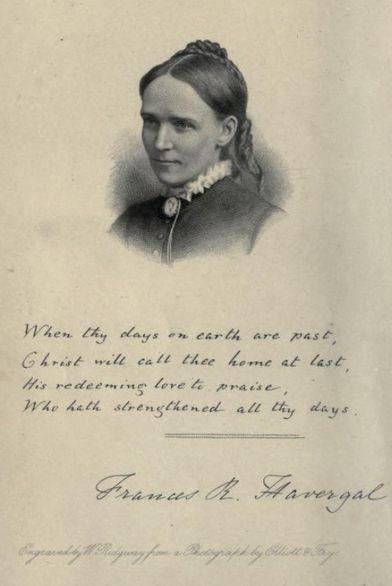
Quotations from Frances Havergal's Letters
(Taken from the Memorials volume.)
On Sinless Perfection:
DEAREST MARIA,—
I have long wanted to explain to you and others in writing (which is easier to me to be clear in, than in conversation, with its natural interruptions) what I see as to the subject, which to me, was undoubtedly the portal into a happy life. As to "perfectionism" or "sinlessness," I have all along, and over and over again, said I never did, and do not, hold either. "Sinlessness" belongs only to Christ now, and to our glorified state in heaven. I believe it to be not merely an impossibility on earth, but an actual contradiction of our very being, which cannot be "sinless" till the resurrection change has passed upon us. But being kept from falling, kept from sins, is quite another thing, and the Bible seems to teem with commands and promises about it. First, however, I would distinctly state, that it is only as and while a soul is under the full power of the blood of Christ that it can be cleansed from all sin; that one moment's withdrawal from that power, and it is again actively because really sinning; and that it is only as, and while, kept by the power of God Himself that we are not sinning against Him; one instant of standing alone is certain fall! But (premising that) have we not been limiting the cleansing power of the precious blood when applied by the Holy Spirit, and also the keeping power of our God? Have we not been limiting 1 John 1. 7, by practically making it refer only to "the remission of sins that are past," instead of taking the grand simplicity of "cleanseth us from all sin?" "All” is all; and as we may trust Him to cleanse from, the stain of past sins, so we may trust Him to cleanse from all present defilement; yes, all! If not, we take away from this most precious promise, and, by refusing to take it in its fullness, lose the fullness of its application and power. Then we limit God's power to "keep;" we look at our frailty more than at His omnipotence. Where is the line to be drawn, beyond which He is not "able?" The very keeping implies total helplessness without it, and the very cleansing most distinctly implies defilement without it. It was that one word "cleanseth" which opened the door of a very glory of hope and joy to me. I had never seen the force of the tense before, a continual present, always a present tense, not a present which the next moment becomes a past. It goes on cleansing, and I have no words to tell how my heart rejoices in it. Not a coming to be cleansed in the fountain only, but a remaining in the fountain, so that it may and can go on cleansing." pp. 102-105
The Story of the Consecration Hymn:
Perhaps you will be interested to know the origin of the consecration hymn, "Take my life." I went for a little visit of five days. There were ten persons in the house, some unconverted and long prayed for, some converted but not rejoicing Christians. He gave me the prayer, "Lord, give me all in this house!" And He just did! Before I left the house every one had got a blessing. The last night of my visit I was too happy to sleep, and passed most of the night in praise and renewal of my own consecration, and these little couplets formed themselves and chimed in my heart one after another, till they finished with, "Ever, ONLY, ALL for Thee!" p. 106 Consecration Hymn
On Singing:
The beautiful couplet in the same hymn, "Take my voice, and let me sing, Always, only for my King," was thenceforth (from December 1873) really carried out. She writes: Let us sing words which we feel and love, sacrificing everything to clearness of enunciation, and looking up to meet His smile all the while we are singing; our songs will reach more hearts than those of finer voices and more brilliant execution, unaccompanied by His power. A sacred song thus sung often gives a higher tone to the evening, and affords, both to singer and listeners, some opportunity of speaking a word for Jesus. p. 106
On God’s Keeping:
DEAR MR. S-, I have just had such a blessing in the shape of what would have been only two months ago a really bitter blow to me; and now it is actual accession of joy, because I find that it does not even touch me. I was expecting a letter from America, enclosing £35 now due to me, and possibly news that "Bruey" was going on like steam, and "Under the Surface" pressingly wanted. The letter has come, and, instead of all this, my publisher has failed in the universal crash. He holds my written promise to publish only with him as the condition of his launching me; so this is not simply a little loss, but an end of all my American prospects of either cash, influence, or fame, at any, rate for a long time to come. I really had not expected that He would do for me so much above all I asked, as not merely to help me to acquiesce in this, but positively not to feel it at all, and only to rejoice in it as a clear test of the reality of victorious faith which I do find brightening almost daily. Two months ago this would have been a real trial to me, for I had built a good deal on my American prospects, now "Thy will be done" is not a sigh but only a song! I think if it had been all my English footing, present and prospective, as well as the American, that I thus found suddenly gone, it would have been worth it, for the joy it has been to find my Lord so faithful and true to all His promises. With regard to many of the promises, there seems no room for even the exercise of faith. It is not that I believe or grasp them, but that I find them all come true as I never did before. The sense of His unutterable loving kindness to me is simply overwhelming . . . Several, times lately I have felt literally overwhelmed and overpowered with the realization of God's unspeakable goodness to me. I say it deliberately, and with thankfulness and joy for which I have no words. I have not a fear, or a doubt, or a care, or a shadow upon the sunshine of my heart. Every day brings some quite new cause for thankfulness; only today He has given me such a victory as I never had before, in a very strong temptation; He lifted me above it in a way I never experienced yet. pp.107,108
On Writing Poetry:
. . . I have not had a single poem come to me for some time, till last night, when one shot into my mind. All my best have come in that way, Minerva fashion, full grown. It is so curious, one minute I have not an idea of writing anything, the next I have a poem; it is mine, I see it all, except laying out rhymes and metre,- which is then easy work! I rarely write anything which has not come thus. "Hidden Leaves" is the title; I wonder how you would work it out after this beginning: "Oh, the hidden leaves of life, Closely folded in the breast!" p. 75
DEAR MR. W. I can't make you quite understand me! You say "F. R. H. could do 'satisfied' grandly!" No, she couldn't! Not unless He gave it it me line by line. That is how verses come. The Master has not put a chest of poetic gold into my possession and said, "Now use it as you like!" But He keeps the gold, and gives it me piece by piece just when He will and as much as He will, and no more. Some day perhaps He will send me a bright line of verse on "Satisfied" ringing through my mind, and then I shall look up and thank Him, and say, "Now, dear Master, give me another to rhyme with it, and then another;" and then perhaps He will send it all in one flow of musical thoughts, but more likely one at a time, that I may be kept asking Him for every line. There, that is the process, and you see there is no "I can do it" at all. That isn't His way with me. I often smile to myself when people talk about "gifted pen" or "clever verses," etc.; because they don't know that it is neither, but something really much nicer than being "talented" or "clever." P.108, 109
Writing “Tell it Out Among the Heathen”:
Her missionary hymn "Tell it out among the heathen" was written at Winterdyne, when unable to go to church one snowy Sunday morning. She asked for her Prayer-Book (in bed), always liking to follow the services for the day. On Mr. Shaw's return from church, he heard her touch on the piano. "Why, Frances, I thought you were upstairs!" "Yes; but I had my Prayer-Book, and in the Psalms for to-day I read 'Tell it out among the heathen that the Lord is King.' I thought, what a splendid first line! and then words and music came rushing in to me. There it's all written out." With copperplate neatness she had rapidly written out the words, music and harmonies complete. Only those who heard her could imagine the brisk ringing time with which she sang this tune. It distressed her when told how slowly and drowsily it was sometimes given.
On “Submission” in “O Master”:
"O Master!" It is perhaps my favorite title, because it implies rule and submission; and this is what love craves. Men may feel differently, but a true woman's submission is inseparable from deep love.
Thoughts on God’s Blessings:
I have been thinking much lately of the Lord's loving, kindness in giving us so much wayside enjoyment, and so much present reward in all our work for him. In spite of dark life enigmas, and real and heavy trials, and often keen inner conflict, not to mention daily burdens of weariness or anxiety or worry, we can set to our seal that "His ways are ways of pleasantness." For, over and above the great gifts, the "blessed hope" set before us, and the quiet "peace with God through our Lord Jesus Christ," what numbers of bits and drops of pleasure and delight one gets, which simply would not exist for us if we were not His children. Just look at Christian intercourse, the meetings without any cloud of suspicion or doubt of each other, the consciousness of true sweet sympathy, the thrill that one does feel when His beloved name is named; all this, even with Christian acquaintances, is a great deal more than all the pleasure or good to be got out of any worldly intimacy or friendship so called. I want to hand over to you what I have been enjoying very much this week, a simple thought enough, but so nice Dr. Caudlish gives (in his beautiful book on the First. Epistle of St. John) as one of the proofs of "fellowship with the Father," etc., our sympathy of aim, His cause being our cause, His kingdom and its advancement our interest, what interests Him interests us, and so on. This seemed at once to transfigure all one's daily life, and, poor little small efforts to speak or write or work for God, and to exalt it into "fellowship." I cannot convey to you how much I enjoyed it, and what a bright reality and force it gave to the words "TRULY our fellowship is with the Father and with His Son Jesus Christ." I like to think how impossible it would be to untwine Christ and the things of Christ from our life, inner and outer; when one comes to think about it He is so really and truly interwoven with our life that one seems to feel the "no separation" not merely as a grand promise, but an actuality which cannot be otherwise. pp.112,113
The Lord is My Portion:
"I have been resting lately on 'The Lord is my portion.' All else is so unsatisfying, and even the best earthly gifts fail to reach the true depths of the heart. I do so love that hymn ‘To Thee, O dear, dear Saviour, My spirit turns for rest.’ What could we do without Him in this lonely world of shadows? And He will not let us do without Him. And may we not reverently and wonderingly say, Neither can He do without us! His people are so entwined around His heart that it must be so.
Trust God:
WINTERDYNE, February 22, 1875.
DEAR MR. I want to thank you for all your prayers for me. Only, only, have the prayers of my dear friends held me back from going to be with the Beloved One! Or is it that He has some more little work for me to do, and so has richly only been answering all your prayers in the "perfect peace" in which He has kept me! Oh, He has been to tenderly gracious to me; it has been such gentle, faithful loving kindness all through. It seems worth even coming back from the very golden gates if I may but in some way "tell of His faithfulness." I do wish people would but trust Jesus out and out, and give themselves up utterly to Him; and then wouldn't they find rest to their souls! But it will be a long waiting time yet, "at least six months," says my doctor, before I may write or do anything. But now just see how wonderfully kind He is to me. He has taken my will as I gave it to Him, and now I really am not conscious of even a wish crossing His will concerning me. I seem to be enabled to be perfectly satisfied with whatever He chooses, and it is so nice. This is all of Him, otherwise I would somehow, of late, I mean for many months, He seems to not have allowed the enemy to come near me. From the hour my illness began I have only had one dark hour, and that was when I thought my special prayer "that this sickness might be for the glory of God, had been denied, for I felt I had not "glorified Him in the fires, because, after I had lost all my strength, I could not bear the pain without moaning and crying out, and showing eagerness for remedies. But He so tenderly assured me of pardon, and gave me "He knoweth our frame," that even that cloud soon passed. In this second illness He has mercifully spared me any recurrence of such pain, only laying upon me discomfort enough to exercise the patience which has perhaps been His chief lesson for me. Perhaps you and other dear friends will be disappointed. I know you expect that the Master will give me new and fuller messages for others after all this. But I really do not know what He has been teaching me; I do not seem conscious (at present), of having gained anything for others; it has been just lying fallow. For myself I feel as if it had intensified my trust; I do trust Him utterly, and feel as if I could not help trusting Him; it seems to "come natural" now! And "I will fear no evil" seems a natural sequence; what should I fear? There is no terror in anything when "safe in the arms of Jesus," and nothing can take me out of them. The marvelous way God has inclined you especially, and others too, for me, does seem such a token of His incomprehensible love to me, that I see I need an eternity to praise Him to my heart's content! Now, dear friend, I am asking Him that, somehow, and in His own time, that He would graciously let me, even me, be the means of some new sweet blessing to you, perhaps to your people too, as a tiny return for all your loving prayers for me.
Do you think that the Lord does show unto His servants things which must shortly come to pass? It was so strange that, while perfectly well and strong in Switzerland, I had a constant presentiment that some form of physical suffering would be the next step in His dealings me, that His loving wisdom would see it needful for me. But, I had not vestige of fear or shrinking; I rather felt I could welcome it, if it might but make me more “meet for the Master's use." So I was not a bit surprised when the illness came.
How infinitely blessed it is to be entirely Christ's. To think that you and I are never to have another care or another fear, but that Jesus has undertaken simply for us And isn't it grand to have the privilege of being His instruments? It does seem such loving condescension that He should use us.
I don't know when I shall get downstairs; much too weak as yet, I am in no hurry. He will give me strength at the right time. Yours, etc., etc. pp. 133,134
Enduring Pain:
Pain, as to God's own children, is truly and really, only blessing in disguise. It is but His chiseling, one of His graving tools, producing the likeness to Jesus for which we long. I never yet came across a suffering (real) Christian who could not thank Him for pain! Is not this a strong and comforting fact! I do not say that they always do so during the very moments of keenest pain, though much more often than not I think they are able to do this; but, certainly, they do deliberately praise Him for it afterwards. I think one must pass through it for oneself before one can fully realize the actual blessedness of suffering; meanwhile, you may well take the testimony of those who have. Its conscious effects are to give one deeper feeling of one's entire weakness and helplessness (a lesson which we are all slow to learn in health), and of the real nothingness of earthly aims and comforts, and the fleetingness and unsatisfactoriness of everything except Christ. Then, it drives one to Him each moment, one cannot bear it even one minute alone, one must lean and cling (and anything is blessed which does this!). And then, one finds that He is tender and gracious, that His promises are precious, that His presence is a reality even if unrealized (a true paradox)! Then, one has opportunities which one could not otherwise have of learning trust, and patience, and meekness; it is a time of growing up into Him in these things. Then, one realizes more what it must have been to Jesus to endure real, actual, bodily pain for us.
Orphanhood
The shadow of orphanhood has now fallen upon you; and therefore His blessed name of Father acquires depth and reality; "doubtless Thou art our Father." Some day, when we are where they reckon not by days and years, He will tell you why He has tried you, and let you look back on your life story and see the golden thread of His fatherly love and care shining over and around it all, —not as it is now, winding in and out, and only seen by glimpses.
"Faithful and True"
"Faithful and True." What a keystone to the grand bridge which His promises have made for us, over the abyss of despair and misery! Faithful as regards us ; True, essentially and inherently.
Experience as a Great Commentary on the Bible
Experience of life is a great commentary on the Bible, and a sort of realization of it. At first, the Bible is a detailed map, which we study and admire; but on the road we find the very same things noticed, but not realized, in one's map. Many of the hills and valleys I read of (and only read of), in the Psalms, seem to have come across my own journey of late. It has been so to-day with Isaiah xxvi. 3, which is rather like sitting under the shadow of a great rock, which was marked in one's map, but was not in sight a few days ago.
"I Have Given Them Thy Word"
"I have given them Thy word ": John xvii. To me this has been a golden key to many other texts, or a sort of seal upon them; the Father's word and the Saviour's gift. Apply this first to the " word of reconciliation," the Father's message of salvation through Christ. Then to the whole Bible; it makes it ten times dearer, and it seems our claim to appropriate every sweet promise.
Trusting God:
“Then trust Him for today
As thine unfailing Friend,
And let Him lead thee all the way
Who loveth to the end.
And let the morrow rest
In His beloved hand,
His good is better than our best,
As we shall understand;
If, trusting Him who faileth never,
We rest on Him today, for ever.
—Starlight Through the Shadows
Encouraging Trust in God’s Power:
Your letter came on the evening of a day of more than usual languor, after a bad night, and it was spiritual sal volatile to me! I am so glad to hear of your ten.
Many thanks for your remembrance of me on Wednesday evening, and for letting me have the pleasure of joining you. Will you tell your "band" that God seemed to put it into my heart, in a very special way, to pray that they all might be soul-winners, and at once! No waiting for further orders, they have got their commission now: "Let him that heareth say, Come!" And I prayed long at Acts iv. 29, 30, for them: "grant unto Thy servants," etc. But there must be power from on high, or they are helpless; and I asked that this might be given. Then, I think the Master gave me a special text for them, will you ask them to take it each one as from Him: " Behold I give you power over all the power of the enemy, and nothing shall by any means hurt you?" Why it is grand; "power over all the power of the enemy!" Just where he is strongest, there they shall prevail; not over his weak points and places, but over every focus of his power; not over his power here and there, or now and then, but over all his power. And Jesus said it! Isn't it enough to go into any battle with! And it is not future; not "I will give," but present, now: "I give unto you," " unto you," to every one whom He sends out, to every one of your dear "ten," if they will but put out the hand of faith to take it. One hardly seems to need any addition to this, and yet His tender love adds the personal assurance, "nothing shall by any means hurt you." Nothing, really and absolutely nothing! So there is not the least loop-hole left for the shadow of a fear to steal in. No end to the promise, it won't leave off, good for every day and moment all along, "till glory." Now, with such a clear commission and such an inspiring promise, which of your "ten" will be content to let another day pass without an attack upon "the power of the enemy?" When shall I hear of the victories that must follow? You will tell me of them, won't you? I want each one of your "ten" to begin at once to work out with God the fulfillment of Isaiah xlix. 25, so that numbers of captives may be delivered from the enemy, and led as blessed, willing, rejoicing captives in the triumph of Jesus Christ. I should like also to send to your "loving F—" "more than conquerors through Him that loved us," and to your "little S—" Jeremiah i.7. Why, only think if he begins winning souls at fourteen, and goes straight on (God sparing him), what splendid sheaves he will have to lay at the Master's feet! Will you ask them to send me a text for myself.
In what I have said I need hardly say I do not forget the other side, that "no man can come to Me except," etc., and so on; but then is not the seeking and obtaining His power a proof that we are on the track of His purposes? "Thy people shall be willing in the day of Thy power," and it is only in "Thy power" that we hope to succeed. I rejoice in your joy in Him. How good He is to us!
I never find that He fails to respond to trust; it is indeed "whatsoever" in its fullness. And now I see that "able" means able, and "all" means all. Do you not find that, even in proportion as we realize this marvelous power upon us and in us, we realize as never before our utter dependence upon it, and utter weakness without it, AND our utter vileness and sinfulness were the cleansing power of His precious blood withdrawn for one moment! But why should we ever refuse to believe in its glorious fullness? (1 John i. 7.)
I keep wondering every day what new loving kindness is coming next! It is such a glorious life And the really leaving EVERYTHING to Him is so inexpressibly sweet; and surely He does arrange so much better than we could for ourselves, when we leave it all to Him. pp. 133-136
(To j. E. J:)
DEAR I realize, "Lord, I have given my life to Thee, and every day and hour is Thine." For, literally, every hour
seems in His hand, and filled with His work in some form or other, either preparation, actual service, or, as now, weakness and pain. It is quite marvelous how He really seems answering my prayer that He would accept my whole life, down to its very moments.
. . . It always seems to me the worst compliment possible to our dear Church of England, when a certain class of minds regard anything which has a little extra life, and love, and warmth, and glow, as being, well— suspicious! As if WE are never to ask, and never to expect, and never to have any such extra blessing as He is pouring out in our very midst! pp.136, 137 God's Power
Taken from Maria Havergal, Memorials of Frances Ridley Havergal, (London: James Nisbet & Co., 1880)
Longer Letters of Frances Ridley Havergal
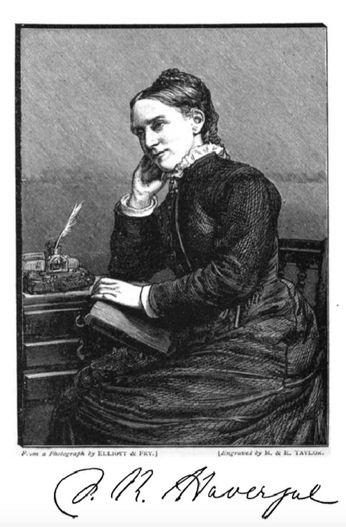
Pain is Truly Blessings in Disguise:
"Pain, as to God's own children, is truly and really, only blessing in disguise. It is but His chiseling, one of His graving tools, producing the likeness to Jesus for which we long. I never yet came across a suffering (real) Christian who could not thank Him for pain! (Read the rest of the Havergal's letter.)
How Much For Jesus?
"He has dealt bountifully with you, and now what shall you render to Him? Has not the practical answer been: “Just as much as I can conveniently spare, after I have rendered all that society asks, and that self or personal enjoyment claims! Just as much as I can spare Him with risk of the least awkwardness, or remark, or self-denial? Of course, one must give up the bulk of one's time, and talents, and influence, and thoughts, and desires, and efforts, to other things; but He shall have just the chips and shavings, the odds and ends, of whatever I don't particularly want for myself or for anybody else!” Does it not, practically, amount to this? And shall it continue to do so? Oh, be “true-hearted, whole-hearted.” Be really His faithful soldier and servant. Throw overboard forever the divided allegiance, which is valueless. Be “only for Jesus,” and you will start out on a new life of blessedness, beyond anything you can imagine; and you will never, never, Never have a regret that you listened to, and obeyed, His own “Follow Me,” even if it involves (as it will) taking up a cross, for there is no true following exempt from it, only the very cross will be gilded with glory." (Read the rest of Frances' letter.)
On Serving Jesus Exclusively:
"I told them I had meant to sing them beautiful songs of Handel, but I could not and dare not; that I could not, after what my King had shown me last week, sing even partly to please them, it must be “only for my King.” Then I told them about this “only,” not merely totality of surrender but exclusiveness of allegiance, and how I wanted everyone there to take this step with me that night, and to accept with me “ONLY for Jesus,” as our life motto, henceforth." (Read the rest of this story of Frances Havergal)
Getting Answers to Prayer:
"When what we ask is founded on a promise or any written evidence of what the will of the Lord is, this is comfortingly clear. But what about petitions which may or may not be according to His will? Surely, then, the condition can only be fulfilled by a complete blending of our own will with His; by His so taking our will, so undertaking it and influencing it for us, that we are led to desire and ask the very thing He is purposing to give. Then, of course, our prayer is answered, and the very pressure of spirit to pray becomes the pledge and earnest of the answer, for it is the working of His will in us." (Read more on this subject from Frances Havergal's book Royal Commandments.)
On Christ's Intercessory Prayers:
"If your heart condemns you, and you know you gave way to indolent coldness when you might have roused yourself to more prayer, will it not touch you to recollect that, in His wonderful long-suffering, Jesus has been praying instead!" (Read all of her thoughts on Christ's prayers from Starlight Through the Shadows)
On Christ For Us:
This is the final chapter of Kept for the Master's Use
"Think of this will as always and altogether on our side—always working for us, and in us, and with us, if we will only let it; think of it as always and only synonymous with infinitely wise and almighty love; think of it as undertaking all for us, from the great work of our eternal salvation down to the momentary details of guidance and supply, and do we not feel utter shame and self-abhorrence at ever having hesitated for an instant to give up our tiny, feeble, blind will, to be—not crushed, not even bent, but blent with His glorious and perfect Will?" (Read the rest of this Frances' chapter on Christ For Us)
On the Privilege of Intercessory Prayer:
"We must not yield to the idea that, because we are feeble members (1 Cor. xli 22.), doing no great work, our prayers 'won't make much difference.' It may be that this is the very reason why the Lord keeps us in the shade, because He hath need of us (Mark xi. 2,3.; though we feel no better than an 'ass's colt') for the work of intercession (job xi. 12.). Many of us only learn to realize the privilege of being called to this by being called apart from all other work Mark 6:31). When this is the case, let us simply and faithfully do it (i Tim. 2:8), 'lifting up holy hands, without wrath and doubting,' blessing His name who provides this holy and beautiful service for those who 'by night stand in the house of the Lord' (Ps. Cxxxxiv. i) See how wonderfully St. Paul valued the prayers of others (2 Cor. i. ii; Eph. vi. 19; Col. Iv. 3: i Thess. v. 25; Heb. xiii. 18). He distinctly expresses this to every Church but one to whom he wrote. Would he have asked their prayers so fervently if he thought it would not' make much difference'?" (Read the rest of Frances Havergal's chapter on intercessory prayer from Royal Commandments)
A Dream Cathedral
In 1857 she wrote about a "Dream Cathedral," a place where in a dream she experienced the distraction of the things of sight and sound when seeking to hear the voice of God.
Articles of Frances Ridley Havergal
Bright Side of Growing Older
In this article drawn from Royal Bounty, Frances enumerates the blessings that come with old age, with the following reminder: "We must not forget that the bright side of Christian experience is ever found in the way of "crucifixion with Christ." Progress in holiness, or the bringing forth of "the fruits of the Spirit" as the unfailing law and result of Christian life—must ever be the measure of Christian light and joy and peace; and this progress in holiness necessarily involves discipline and trial and spiritual conflict. The road to Heaven is indeed a bright road, but we have to learn much on the way; and clouds, and crosses, and even falls are often our lesson books." (Read all of Bright Side of Growing Older.)
The Later Years
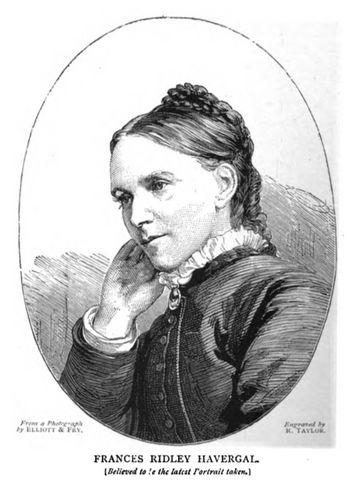
Welsh Workshop & Daily Life
Havergal was incessantly burdened working on projects and responding to correspondence. In October of 1878, less than a year before she passed away, she joined her sister at a much appreciated Welsh "retreat," overlooking Caswell Bay. The remote location, however, did not mean resting from her labors. Click on the link to learn more about her study and her busy round of activities. She sketched the picture herself.
A Visit to the Mumbles Haven
This sketch, written by Emily Coombe, gives a touching picture of what it was like in the various rooms of her "nest" and the surrounding countryside and village.
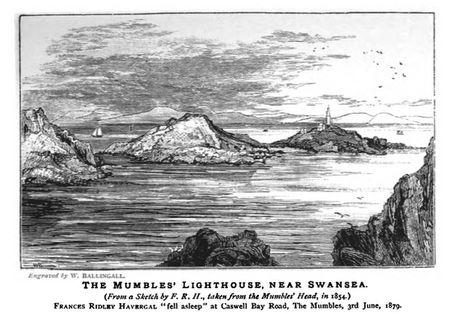
Her Death
Frances died at Caswell Bay, Swansea, June 3, 1879, at the age of 42. Here is a picture of her tomb and the inscription.
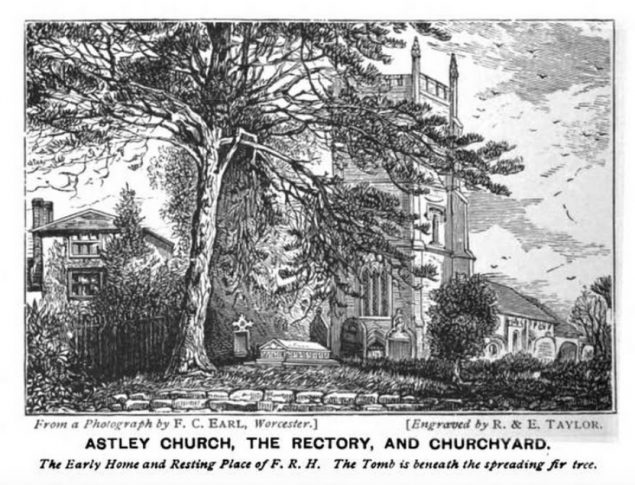
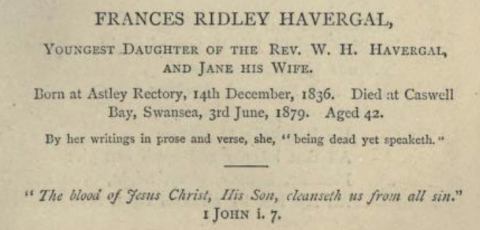
F.R.H. Directory
Bible Study and Devotional Life
Hymns and Quotations on Music and Art
Books of Frances Ridley Havergal
Quotations from Frances’ Letters